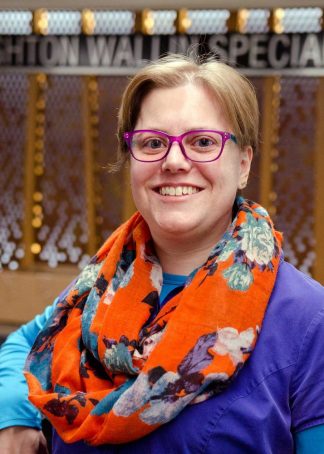By Allison Campbell-Jensen
In trying times, we all want someone to lean on — someone reliable, professional, and caring. Someone like Mary Blissenbach, Student Supervisor for Archives and Special Collections.
In fall 2020, four University libraries — Health Sciences, Magrath, Walter, and Wilson libraries — opened with regular hours. The Elmer L. Andersen Library that houses Archives and Special Collections also opened although in a much more limited way. Researchers needed to make an appointment a week in advance for time slots on half-days, Monday, Tuesday, Thursday, and Friday.
Blissenbach scheduled the researchers’ appointments and when they arrived, as part of the normal orientation, she explained the COVID precautions to them.
“She is our front line as we open up Archives and Special Collections to researchers,” says Kate Dietrick, Archivist of the Nathan and Theresa Berman Upper Midwest Jewish Archives. “She has done a fantastic job in coordinating a difficult changing world for them.”
By appointment only
“I think [Mary’s] welcoming presence helps put people at ease, especially those who might be a little bit intimidated by their first visit to a ‘special’ collection or archives.”
—Tim Johnson
Prior to COVID, Blissenbach’s job involved more reference work, such as helping researchers new to Archives and Special Collections get started on their research. Lately, however, “it felt like the job at the reception desk was a bit more of a scheduler type,” she says. Unlike the past, when researchers could be trained one day and then come and go as they pleased, researchers have to make appointments before every visit.
The system works well. Blissenbach is on the desk most days; students staff it on Thursdays. This fall, two regular users came in as often as they could. “One of our long-term researchers talked about how thankful they were that it was so efficient,” Blissenbach says. Researcher Gabe Horner says that Blissenbach was “exceedingly polite, helpful and thorough in helping me understand the new protocols.”
Staff from collections would pull materials a week before users’ appointments and, after their use, the materials also would be put under quarantine before being re-shelved or copies made. “I felt safe,” Horner says.
Timothy Johnson, E. W. McDiarmid Curator of the Sherlock Holmes Collections, is delighted to have Blissenbach as a colleague.
“Mary’s one of the first faces a visitor might see when visiting Andersen Library (or virtually via email) and I think her welcoming presence helps put people at ease, especially those who might be a little bit intimidated by their first visit to a ‘special’ collection or archives.”
Caring for student workers
Blissenbach’s attention to the researchers’ needs and safety mirrors her care of the student workers under her supervision.
“Mary really has been the linchpin in getting our services open,” says Suzan Hallgren, Operations Coordinator for Archives and Special Collections. “She is the one who organized our student staffing. Our student staffing is so challenging right now because some students want to work, some don’t, some want to be in-person, some don’t, and many are working on projects remotely.”
Blissenbach keeps track of student workers’ preferences and schedules, makes sure they have PPE training from Building Manager Nick Fugate, and trains them in the new protocols so that they feel comfortable while at work. Johnson says: “She’s been great at organizing student workers, especially in a remote setting during the pandemic closure, and making sure all the details are taken care of when we have been open to researchers on a limited basis.”
He also compliments her stamina. “It’s a long commute from St. Cloud to the Twin Cities and back, yet with all that traveling she maintains such a good sense of humor through it all.”
In the pre-pandemic times, Hallgren notes, Blissenbach first made sure each student worker was trained in central processing techniques, then they served in the reading room and in an archival unit.
“She has a really nice approach to student employment — she helps them try to build skills for the future,” Hallgren says. “After they are trained, she matches them with units that are of interest to them.”
A student who is in the marching band got to work on the band’s records in University Archives, which was exciting for him and helpful to the Archives.
The student workers’ experiences may have helped them develop unflappability. This fall, researchers had to call to be let into the locked building. “One researcher had forgotten their phone and came over to the window and tapped on the window to say, ‘I’m here,’” Blissenbach says.
“They were expected, so it didn’t scare the student that much.”





